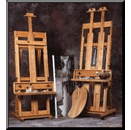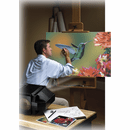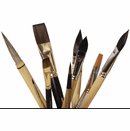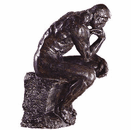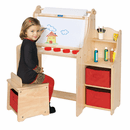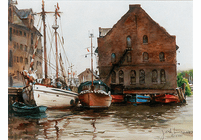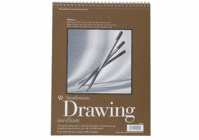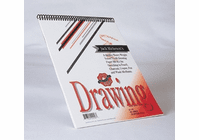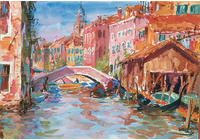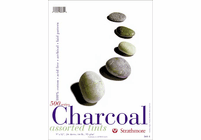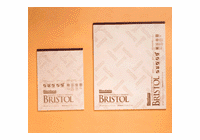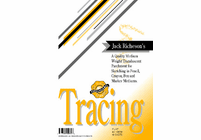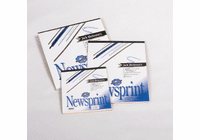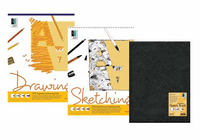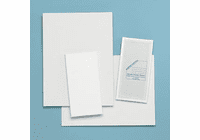Drawing Pads & Paper
We have many high quality products available to choose from. The Sketchpad is intended to be carried with the artist and pulled out whenever the inspirational moment strikes. The Drawing Pads & Paper use heavy-duty stock in order for an artist to take that sketch and produce a finished work of art. You can use many different types of medium, including pencil, graphite or colored, charcoal, and even watercolor on most papers.
We have several brands that will it your artistic needs.
Drawing Pads & Paper are versatile enough that they can be used for a beginner, a student, or an avid professional artist.
We have several brands that will it your artistic needs.
- Strathmore - makes Drawing Pads, Layout Sheets, and Charcoal Pads.
- Jack Richeson - Newsprint, Tracing, Drawing, and Sketch Pads.
- Alvin Drawing Paper - comes in a wide range of sizes and colors.
- Bristol Drawing Pads - pages are heavy-duty with a smooth surface.
Drawing Pads & Paper are versatile enough that they can be used for a beginner, a student, or an avid professional artist.
In the June 2004 issue of Artist's Sketchbook, veteran artists Jessica Zemsky and Jack Hines were interviewed about their sketchbook habit. Here are a couple of excerpts from the interview.
Jack Hines: I wouldn't say sketchbooks were required in art school, but it was clear that if you weren't keeping one, you were doing less. I think the teachers were very smart. They tried to instill the sketchbook habit in your conscience so that you felt guilty if you didn't go to the circus when it was in town or the ballet, the symphony, or whatever.
The sketchbook starts out as being an admonition to draw all the time. And, of course, drawing is the basis. We've had workshop students who whine about the life-drawing class, which we always required. They'd say, "I really don't care much about drawing; I just want to paint." Of course, the response to that is: "What do you think you're going to paint if you can't draw?" Painting is an extension of the practice of drawing. It's the refinement of it.
Jessica Zemsky: In my school, the Pratt Institute, they said, "Think of yourself as a musician and practice every day." Regardless of what you were working on, you should practice drawing; and keeping a sketchbook is the way to do it. Have a little sketchbook with you and draw any old thing all the time.
You have to be able to carry them comfortably. When you're moving around, you don't want anything too big. And it's a little intimidating if you have a big sheet of paper. If you have just a little tidbit, that's kind of fun, it's like an hors d'oeuvre. You have a chance to do several small pieces in a shorter time rather than commit yourself to a big piece. So if you keep it small and keep it simple, the chances are much better of having a lovely book to keep for later on.
Jack Hines: I wouldn't say sketchbooks were required in art school, but it was clear that if you weren't keeping one, you were doing less. I think the teachers were very smart. They tried to instill the sketchbook habit in your conscience so that you felt guilty if you didn't go to the circus when it was in town or the ballet, the symphony, or whatever.
The sketchbook starts out as being an admonition to draw all the time. And, of course, drawing is the basis. We've had workshop students who whine about the life-drawing class, which we always required. They'd say, "I really don't care much about drawing; I just want to paint." Of course, the response to that is: "What do you think you're going to paint if you can't draw?" Painting is an extension of the practice of drawing. It's the refinement of it.
Jessica Zemsky: In my school, the Pratt Institute, they said, "Think of yourself as a musician and practice every day." Regardless of what you were working on, you should practice drawing; and keeping a sketchbook is the way to do it. Have a little sketchbook with you and draw any old thing all the time.
You have to be able to carry them comfortably. When you're moving around, you don't want anything too big. And it's a little intimidating if you have a big sheet of paper. If you have just a little tidbit, that's kind of fun, it's like an hors d'oeuvre. You have a chance to do several small pieces in a shorter time rather than commit yourself to a big piece. So if you keep it small and keep it simple, the chances are much better of having a lovely book to keep for later on.
Copyright © 2002-2025 Madison Art Shop™ LLC. All Rights Reserved.


